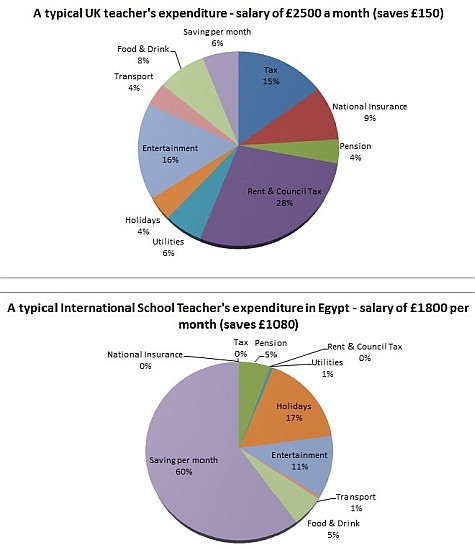The standard question by a recruiter at the end of an interview with a prospective International School teacher is, “Is there anything else that we have not covered?” Inevitably the issue of remuneration is raised. International school salaries vary widely. What should you take into account when evaluating a potential salary?
For a teaching job in Egypt, for example, the candidate may be told: “The average teacher’s annual salary is £20,000.” The typical initial reaction (particularly if the candidate has never worked in the international sector and has only worked in the UK state system) is, “You cannot be serious! I am earning twice that salary at the moment!”
 This is generally the case, but the full remuneration package offered by international schools is worth much more than the candidate first thinks. In the case mentioned above, the salary is tax free and there are no other deductions, for example national insurance.
This is generally the case, but the full remuneration package offered by international schools is worth much more than the candidate first thinks. In the case mentioned above, the salary is tax free and there are no other deductions, for example national insurance.
However, this is just the beginning! The school finds and either pays for or heavily subsidizes accommodation (so no mortgage or rent to pay, and no council tax), health insurance, contribution to a pension fund, annual flights home, relocation allowance, transport to and from school, and reduced school fees for the teacher’s children.
The other factor to consider is that the cost of living in many countries is lower than in the UK, so that weekly bills are far more favourable. The bulk of the salary, therefore, can be devoted to an enjoyable social life, travel and savings. Added to this, the bonus is that International Schools are often situated in interesting locations offering experience of different cultures.
So, the prospective candidate ought to do some research about the comparative cost of living in the location of target schools (a useful website is www.numbeo.com ) and check carefully the full remuneration package. There might be some pleasant surprises!

International school salaries – other factors to consider
While the remuneration packages for international school teachers are favourable and enable a pleasant lifestyle, travel opportunities and saving, under certain circumstances there are some drawbacks, of which the prospective applicant must be aware and carefully research. For example, if existing financial obligations need to be met, consideration must be given to the solution. The most common issues are a mortgage, significant loans or debts, and financing children’s school or university fees. Typically, the mortgage issue is not a problem if the property can be let. The other two might well be a challenge as the remuneration is unlikely to support the servicing of extra financial commitments back home.
 The other situation that can often be a challenge is if the international school teacher has a non-teaching partner, or if the teacher has a family and the partner does not have an income. The most obvious solution to this problem is if the partner is able to get some sort of employment. Occasionally, the school is able to help in offering a classroom assistant position or some clerical post. Alternatively, a neighbouring international school may have an opening or the partner may well obtain some other employment locally, but such opportunities are rare, in particular in a country where English is not the predominant language. It is essential to research and consider the implications of this issue and it is vital to raise this at interview. It is possible to live on one salary, but it is a challenge.
The other situation that can often be a challenge is if the international school teacher has a non-teaching partner, or if the teacher has a family and the partner does not have an income. The most obvious solution to this problem is if the partner is able to get some sort of employment. Occasionally, the school is able to help in offering a classroom assistant position or some clerical post. Alternatively, a neighbouring international school may have an opening or the partner may well obtain some other employment locally, but such opportunities are rare, in particular in a country where English is not the predominant language. It is essential to research and consider the implications of this issue and it is vital to raise this at interview. It is possible to live on one salary, but it is a challenge.
On the other hand, the benefits of being a teaching couple are significant. Sharing the living costs is an obvious advantage and allows more scope for the extras such as an active social life, travel and saving. In fact, many young teachers often choose to share accommodation with colleagues, not only for the economic advantage that this brings, but also for mutual support and companionship in their new environment. A word of warning for unmarried couples applying to international school jobs in certain countries, just check at interview if you will be allowed to live together.